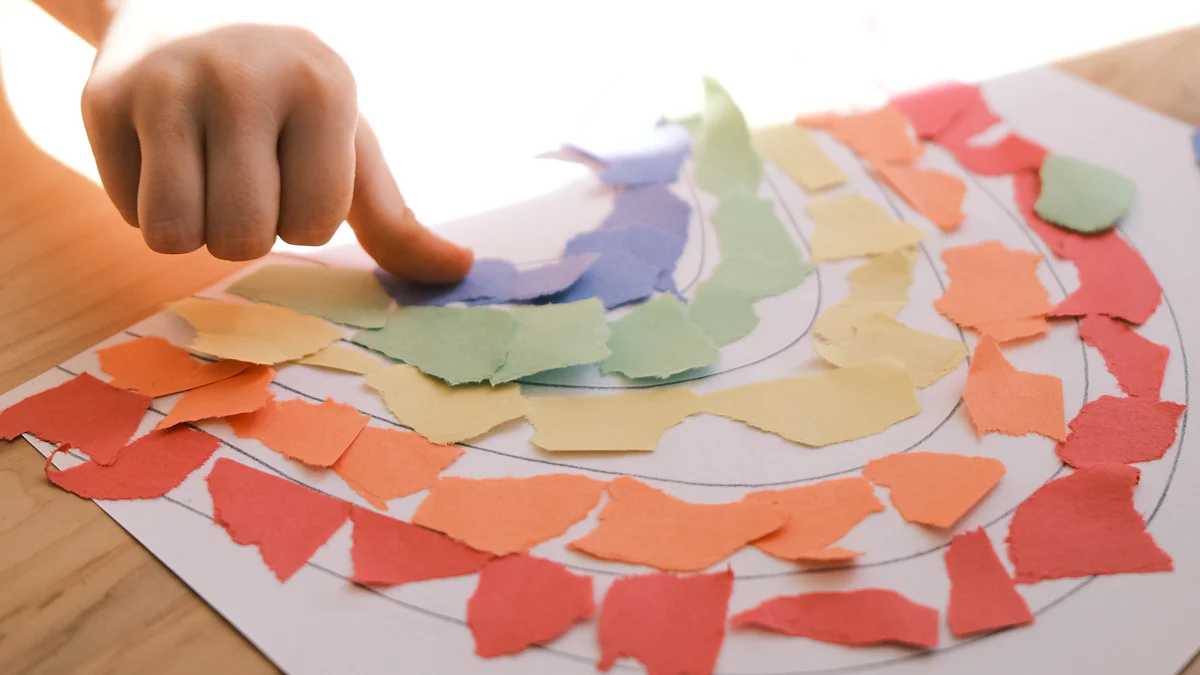The Benefits of Boredom: Letting Your Kids Be Creative on Their Own

Boredom often feels uncomfortable, yet it holds incredible potential for your child's growth. The Child Mind Institute highlights how boredom can unlock creativity and independence. When children experience boredom, they tap into their imagination and develop problem-solving skills. A child psychologist might say that boredom encourages self-discovery and resilience. The Benefits of Boredom include fostering a sense of identity and motivation. Even companies like Apple value creativity born from unstructured time. Embrace boredom as a tool for nurturing your child's creative spirit.
Understanding the Benefits of Boredom
What is Boredom?
Definition and common misconceptions
Boredom often appears as a lack of interest or excitement. Many people think boredom is negative. Some believe boredom leads to laziness. However, boredom can serve as a powerful tool for growth. Boredom provides opportunities for creativity and self-reflection. The Benefits of Boredom include sparking innovation and imagination.
How boredom manifests in children
Children show boredom through restlessness or complaints. Some children may seem uninterested in activities. Others might wander around aimlessly. Boredom often pushes children to explore new ideas. Children engage in Free Play when boredom strikes. Free Play encourages children to invent games or stories. This process nurtures creativity and problem-solving skills.
The Role of Boredom in Development
Psychological and emotional aspects
Boredom plays a crucial role in emotional growth. Children learn patience and self-control during boring moments. These experiences help children manage emotions better. Boredom also fosters self-awareness. Children reflect on their feelings and thoughts. This reflection builds a strong sense of identity. Emotional resilience grows from overcoming boredom.
Boredom as a catalyst for creativity
Boredom ignites creativity by encouraging exploration. Children discover new interests through Free Play. Unstructured time allows children to experiment with ideas. Creativity flourishes when children create without limits. Many successful innovations arise from boredom. The Benefits of Boredom include inspiring unique solutions. Encouraging boredom leads to lifelong creative skills.
The Creative Benefits of Boredom

Encouraging Imagination
How boredom sparks imaginative play
Boredom gives children a chance to explore their minds. Kids often look for entertainment when they feel bored. This search leads to imaginative play. Boredom encourages kids to invent games and stories. Children develop creative skills by using everyday objects in new ways. A simple stick becomes a magic wand. A cardboard box transforms into a spaceship. Boredom makes room for endless possibilities.
Examples of creative activities born from boredom
Children often surprise adults with their creativity. Building forts with blankets or creating art with leaves are common activities. Kids may also invent new sports or write songs. Boredom helps kids develop unique hobbies. Many famous artists and inventors found inspiration during quiet moments. Boredom prepares kids for creative thinking in the future.
Problem-Solving Skills
Developing critical thinking through self-directed play
Boredom teaches kids to solve problems on their own. Children face challenges when they play without direction. Kids learn to think critically and find solutions. Beurkens, a child development expert, notes that boredom ignites independence. Self-directed play strengthens decision-making skills. Children learn to adapt and overcome obstacles.
Real-life scenarios where boredom led to problem-solving
Many parents witness boredom leading to problem-solving. Kids might create a new game when toys seem dull. Some children build complex structures with blocks. Others design puzzles for friends. Boredom prepares kids for real-world challenges. Beurkens emphasizes that boredom makes kids resourceful. Boredom encourages kids to view problems as opportunities.
Fostering Independence in Children
Self-Directed Learning
Children thrive when they explore the world on their own terms. Autonomy in learning builds confidence and curiosity. Gia Miller, a renowned educator, emphasizes the importance of letting children take charge of their education. Children who direct their own learning develop a growth mindset. This mindset encourages them to embrace challenges and learn from mistakes. Josh Burgoyne, an education expert, believes that self-directed learning fosters resilience.
Encouraging exploration and curiosity leads to creative learning. Children discover new interests and passions through unstructured play. Jodi Musoff, a child development specialist, notes that boredom can be a powerful catalyst for growth. Children who explore independently often find innovative solutions to problems. This exploration nurtures a lifelong love for learning.
Building Resilience
Boredom teaches children to cope with discomfort. Lee, a child psychologist, explains that facing boredom helps children develop a growth mindset. Children learn to find creative ways to entertain themselves. This process builds resilience and adaptability. Gia Miller highlights that overcoming boredom strengthens problem-solving skills. Children become more resourceful and confident.
The long-term benefits of resilience are profound. Children who develop a growth mindset handle challenges with grace. Josh Burgoyne asserts that resilience prepares children for future success. Children grow into adults who view obstacles as opportunities. This mindset fosters personal and professional growth. The Creativity Research Journal supports the idea that resilience enhances creativity.
Parents can encourage independence by embracing boredom. When a child says, “I’m bored”, respond with enthusiasm. Say, “I can’t wait to see the fun you are going to create!” This approach empowers children to take control of their experiences. Children learn to value downtime and use it for personal growth. Boredom becomes a tool for developing a growth mindset and fostering independence.
Practical Tips for Parents to Encourage Creativity

Creating a Boredom-Friendly Environment
Setting up spaces that encourage creativity
Creating a space that fosters creativity involves thoughtful planning. Belton, a renowned expert, suggests using open areas with minimal distractions. A room with art supplies, musical instruments, or building blocks can inspire imagination. Letting kids be bored in such an environment can lead to unexpected creative outcomes. The Melbourne Child Psychology center emphasizes the importance of a clutter-free area. Children need room to move and explore. Nicole Beurkens, a clinical expert, advises against overcrowding the space with toys. Fewer options often lead to more inventive play.
Providing resources without over-scheduling
Providing resources without overwhelming children is crucial. Musoff, a child development specialist, recommends a variety of materials. Books, puzzles, and art supplies should be readily available. Parents should avoid filling every moment with structured activities. Over-scheduling can stifle creativity. Encouraging outdoor play also provides a natural setting for exploration. Children benefit from time spent in nature. Gasper and Middlewood highlight the value of unstructured outdoor time. Kids learn to entertain themselves and develop problem-solving skills.
Balancing Guidance and Freedom
Knowing when to step back
Knowing when to step back requires intuition and trust. Musoff advises parents to observe rather than intervene. Children need opportunities to solve problems independently. Clinical experts agree that stepping back fosters resilience. Embrace failure as a learning opportunity. Letting children make mistakes builds confidence. Encourage children to try new things without fear of judgment. Musoff believes that this approach nurtures a growth mindset.
Encouraging safe exploration
Encouraging safe exploration involves setting boundaries. Parents should ensure a secure environment for play. Musoff suggests clear guidelines for safety while allowing freedom. Children thrive when they feel trusted. Embrace failure as part of the learning process. Kids grow from experiences that challenge them. Clinical experts recommend monitoring without hovering. This balance allows children to explore their interests. Musoff emphasizes the importance of letting kids take risks. Safe exploration leads to lifelong learning and adaptability.
Addressing Common Concerns about Boredom
Fear of Unproductivity
Understanding the value of downtime
Parents often worry about children being unproductive during downtime. However, downtime offers valuable opportunities for creativity and self-discovery. Creativity comes to life when invited in moments of boredom and stillness. Children need time to explore their thoughts and interests without constant stimulation. A break from organized activities allows kids to recharge and reflect. This reflection fosters a deeper understanding of personal passions and goals. Encourage children to embrace downtime as a chance for growth and creativity.
Reassuring parents about developmental benefits
Boredom plays a crucial role in child development. Parents should feel reassured about the developmental benefits of boredom. Boredom encourages children to think independently and solve problems. Children learn to entertain themselves and develop resilience. These skills prepare children for future challenges. Boredom also promotes self-awareness and emotional intelligence. Parents can support their child's growth by allowing them to experience boredom. Embrace boredom as a tool for nurturing creativity and independence.
Managing Screen Time and Technology
Setting boundaries for digital devices
Screen time often becomes a concern for parents. Setting boundaries for digital devices helps manage this issue. Establish clear rules for when and how long children can use screens. Encourage children to engage in offline activities instead. Older kids may benefit from having specific times for technology use. Parents can lead by example by limiting their own screen time. A balanced approach ensures that technology does not dominate a child's life. Book your initial parent meeting to discuss strategies for managing screen time effectively.
Encouraging offline activities
Encouraging offline activities provides children with alternative ways to spend their time. Activities like reading, drawing, or playing outside stimulate creativity. Children can explore hobbies and interests without relying on screens. Visiting a park or engaging in sports promotes physical health. Parents can introduce children to new experiences and challenges. This exploration helps children develop a well-rounded skill set. Book your initial parent consultation to discover more ways to encourage offline activities. Medicare Rebates may be available for families seeking professional guidance.
Boredom unlocks creativity and independence in children. Boredom encourages imagination and problem-solving skills. Children develop resilience through boredom. Parents can embrace boredom as a tool for growth. Boredom fosters self-discovery and emotional intelligence. Parents can support children by allowing unstructured time. Boredom prepares children for future challenges. Encouraging boredom leads to lifelong creative skills. Parents can nurture a child's creative spirit through boredom.
See Also
Exploring the Positive Impact of Boredom on Children's Minds
Helping Children Master the Skill of Self-Soothing
Essential Daily Habits to Build Your Child's Confidence
Fostering Inquisitiveness: The Importance of Questioning in Child Growth

